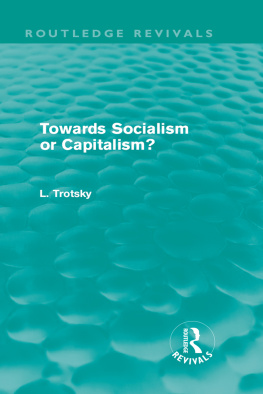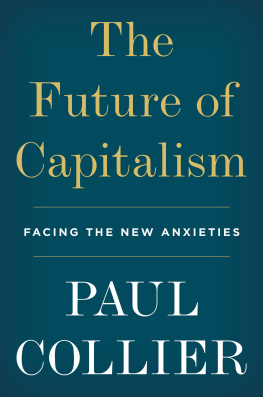Simpson - Capitalism versus Socialism: What Does the Bible Have to Say?
Here you can read online Simpson - Capitalism versus Socialism: What Does the Bible Have to Say? full text of the book (entire story) in english for free. Download pdf and epub, get meaning, cover and reviews about this ebook. year: 2020, publisher: Thomas D. Simpson, genre: Politics. Description of the work, (preface) as well as reviews are available. Best literature library LitArk.com created for fans of good reading and offers a wide selection of genres:
Romance novel
Science fiction
Adventure
Detective
Science
History
Home and family
Prose
Art
Politics
Computer
Non-fiction
Religion
Business
Children
Humor
Choose a favorite category and find really read worthwhile books. Enjoy immersion in the world of imagination, feel the emotions of the characters or learn something new for yourself, make an fascinating discovery.
Capitalism versus Socialism: What Does the Bible Have to Say?: summary, description and annotation
We offer to read an annotation, description, summary or preface (depends on what the author of the book "Capitalism versus Socialism: What Does the Bible Have to Say?" wrote himself). If you haven't found the necessary information about the book — write in the comments, we will try to find it.
Capitalism versus Socialism: What Does the Bible Have to Say? — read online for free the complete book (whole text) full work
Below is the text of the book, divided by pages. System saving the place of the last page read, allows you to conveniently read the book "Capitalism versus Socialism: What Does the Bible Have to Say?" online for free, without having to search again every time where you left off. Put a bookmark, and you can go to the page where you finished reading at any time.
Font size:
Interval:
Bookmark:

Copyright 2020 by Thomas D. Simpson
Capitalism versus Socialism: What Does the Bible Have to Say?
All rights reserved. No part of this publication may be reproduced, distributed or transmitted in any form or by any means, including photocopying, recording, or other electronic or mechanical methods, without the prior written permission of the publisher, except in the case of brief quotations embodied in critical reviews and certain other noncommercial uses permitted by copyright law.
Although the author and publisher have made every effort to ensure that the information in this book was correct at press time, the author and publisher do not assume and hereby disclaim any liability to any party for any loss, damage, or disruption caused by errors or omissions, whether such errors or omissions result from negligence, accident, or any other cause.
Adherence to all applicable laws and regulations, including international, federal, state and local governing professional licensing, business practices, advertising, and all other aspects of doing business in the US, Canada or any other jurisdiction is the sole responsibility of the reader and consumer.
Neither the author nor the publisher assumes any responsibility or liability whatsoever on behalf of the consumer or reader of this material. Any perceived slight of any individual or organization is purely unintentional.
The resources in this book are provided for informational purposes only and should not be used to replace the specialized training and professional judgment of a health care or mental health care professional.
Neither the author nor the publisher can be held responsible for the use of the information provided within this book. Please always consult a trained professional before making any decision regarding treatment of yourself or others.
Cover design by
Formatted by FormattedBooks.com
ISBN: 978-1-7348156-2-7
Dedication
This book is dedicated to my friend, partner, soul mate, and wife, Cindy, who has encouraged and supported me throughout this book-writing venture.
Those who do not remember the past are condemned to repeat it.
GEORGE SANTAYANA
For a free workbook to assist you in getting the most from this book, go to:
Thomasdsimpson.com/gift
Contents
O ne of the more startling developments of recent years has been a renewed enthusiasm for socialism, especially among millennials and Generation Z. Indeed, opinion polls show that American millennials and Generation Zers have a highly favorable attitude toward socialism. Polls indicate that upwards of 70 percent of people in these age groups favor socialism. They perceive that socialism provides more economic security, a greater sense of togetherness, and more equality of wealth and income. Adding to the popularity of socialism is an underlying notion that, under socialism, the things we wantcollege education, health care, and housingwould be free of charge. Theres very little realization that these things require costly resources and must, at the end of the day, be paid for. In other words, to get these things for free, ultimately, we have to give up other thingsindeed, a lot of these other thingsthat we also value.
Very seldom do you hear proponents of socialism addressing the other side of the coin: What the average person must give up to get these freebies. And how, in the end, it will be impossible to satisfy everybodys wants. Invariably, there will be some type of unpopular rationing procedure to determine who the lucky ones are who get the scarce items being provided for free. Moreover, these rationing procedures inevitably pose an irresistible temptation for corruption. Those deciding who actually gets the scarce item can line their pockets with surreptitious payments from those most wanting it. It happens all the time.
Overlooked, too, is the tendency for such centrally directed economic systems to override personal freedom. When the government makes choices for us, we have ceded our right to make those choices ourselves. And the more choices that weve turned over to the government, the more our personal freedom has been curtailed.
Also playing a role is an attitude that has developedaided by the media and Hollywoodthat our market-based (capitalistic) system is based on greed, exploitation, and abuse. Its a rigged system in which the average person doesnt have a chance.
In addition to being unfair and drawing out the worst in people, inherent in capitalism are financial crises and major economic disruptions. Indeed, the financial crisis and Great Recession of 2008 and 2009 played an indisputable role in fostering these attitudes. Capitalism is portrayed as a dog-eat-dog system in which only the fittest and craftiest survive. This can be pretty scary, especially for those who have always gotten a shiny trophy for participating in competitive events, regardless of where they finished. The popularity of Bernie Sanders and, more recently, Alexandria Ocasio-Cortez (AOC) epitomizes the attraction of millennials and Gen Z to socialism.
Meanwhile, Che Guevara, associated with Marxist revolutionary movements in the Western Hemisphere, is lionized as a champion of the downtrodden. Che is commonly found on tee shirts of the young. Lost in all of this is the historical record of the real Che. The real Che was ruthless in his dealings with anyone who opposed him. He was responsible for the murder of thousands and he fiercely beat thousands more.
The popularity of socialism seems ironic in light of the long trail of failures of socialism in its various forms, including pervasive corruption and brutal suppression of opponents. Moreover, we can watch a real-time example in Venezuela, which has been disintegrating before our very eyesempty shelves, ongoing electrical blackouts, vanishing health care, historic hyperinflation, government repression, widespread corruption, and murders of families seeking to escape across its borders. Or contrast North and South Koreathe former a communist (socialist) system and the latter a capitalist (or market-based) system. The people who live in these countries share the same cultural heritage and inhabit the same corner of the earth. Yet one group perpetually lives at the edge of starvation and is subjugated by a vicious regime while the otherwhich may have produced your car, TV, or smart phonethrives.
These examples reveal a huge chasm between the utopian ideals of socialist thinkers and actual performance. Interestingly, those countries that had been socialist in Eastern Europe have embraced market principles and have no desire to return. Nonetheless, Bernies views on the desirability of socialism have changed little over the decades, even in the face of the lengthy string of failures. The examples also reveal a widespread jaundiced view of the contributions of market (capitalist) systems, which have done more to raise standards of living around the world and lift people out of poverty than any other economic system in history.
This fascination with socialism by millennials and Gen Z is another example of the validity of George Santayanas statement that Those who dont remember the past are condemned to repeat it.
Yet many have argued that socialism is most consistent with biblical teachings. Frequently mentioned is the early church in Jerusalem described in Acts 2:42-47. Believers were selling their possessions and sharing with others, so that the needs of each member of that community were being met. Also, other biblical references to caring for the poor and the curse of being rich are viewed as supporting a system in which government performs the role of the levelerredistributing wealth from the rich to the poor.
Next pageFont size:
Interval:
Bookmark:
Similar books «Capitalism versus Socialism: What Does the Bible Have to Say?»
Look at similar books to Capitalism versus Socialism: What Does the Bible Have to Say?. We have selected literature similar in name and meaning in the hope of providing readers with more options to find new, interesting, not yet read works.
Discussion, reviews of the book Capitalism versus Socialism: What Does the Bible Have to Say? and just readers' own opinions. Leave your comments, write what you think about the work, its meaning or the main characters. Specify what exactly you liked and what you didn't like, and why you think so.

















